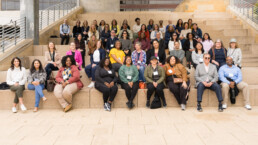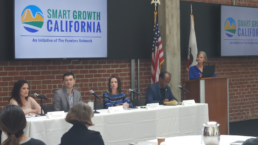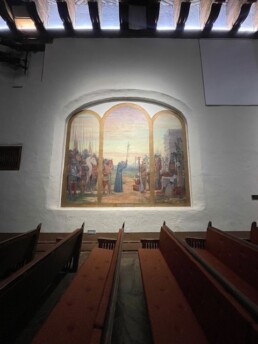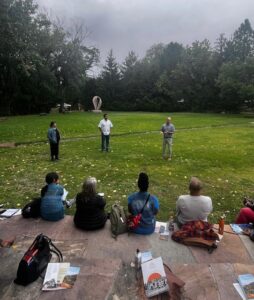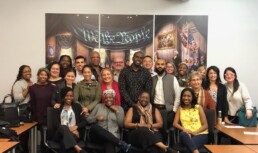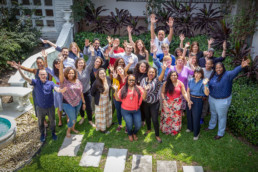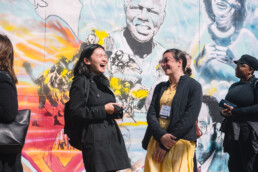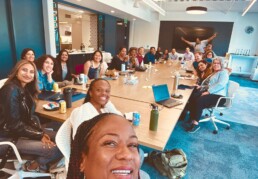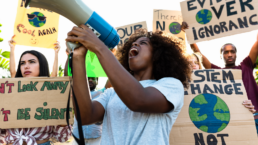Advancing Community, Climate and Connection: Key Takeaways from TFN's 2024 Spring Convening
BY Brooke McPherson, TFN Communications and Engagement Associate
I’ve been working with TFN now for more than six months, but it wasn’t until just a few weeks ago that I got to finally connect with my colleagues in person. Last month, I had the unique opportunity to travel to Austin, Texas to participate in TFN’s Spring Convening of the GREEN, Urban Water Funders and Mobility and Access Collaborative working groups.
The convening was the first time TFN had gathered these three working groups together, but between the enthusiasm for shared learning and the energy on our site visits, a newcomer like myself could have easily mistaken this for a family reunion.
The agenda was absolutely packed and covered a broad range of intersectional topics from water conservation efforts by the City of Austin to power building in politically hostile environments across the country. It was a lot to take in, and I’m still processing all I’ve learned weeks later. Here are some of my main takeaways from our time together in Austin:
Leading with Action
A central focus of the convening was the need for bold philanthropic leadership with a clear bias towards action, so it made sense that TFN should model what we preach.
It's been a longtime practice at TFN to open meetings with a land acknowledgement as a way of honoring the Indigenous peoples connected to the land we gather on. TFN’s President and CEO Dion Cartwright highlighted how Indigenous communities continue to see the worst impacts of the climate crisis yet only receive a sliver of philanthropic dollars. I was particularly excited to hear Dion introduce a new practice at TFN:
Whenever we hold any in-person event, TFN will make a donation to
a local Indigenous tribe or Indigenous-led organization.
For this gathering, TFN donated $1,000 to the Texas Tribal Buffalo Project, a non-profit that works to restore the traditional relationship between the Lipan Apache and the native Bison, providing the Indigenous communities of Texas a pathway to tribal and food sovereignty. You can learn about their important work here.
Money Talks; Let’s Amplify The Impact
Christopher Coes, assistant secretary for Transportation Policy for the U.S. Department of Transportation, joined us and shared his take on the transformative potential of philanthropy.
In this current era of massive government investment in infrastructure, environmental and clean energy projects across America, the conversation around philanthropic action is no longer a matter of “Can we do this?” Substantial, transformative change is happening across the country thanks to the work being accomplished by organizations large and small, so the real question now is “How can we do it better?”
Coe’s solution? Storytelling.
Success stories are an essential tool in justifying the new models that progressive policies are working to put in place. Effective storytelling brings the numbers behind reports to life, captures people and policymakers’ attention and can drive them to action.
As a member of the communications team here at TFN, I’m always keeping my eye out for ways we can amplify our funders’ work. After hearing from Coe, I’ve started thinking about social media less as a way of keeping folks informed and more as a catalyst for direct change.
TFN has partnered with the Health and Environmental Network and Neighborhood Funders Group on a joint effort to help funders connect their communities to federal dollars. This work is ongoing, and includes a round-up of resources and a downloadable “tip sheet” for funders. We’re also working on amplifying ways place-based foundations can help their communities access these historic federal investments and ensure those dollars get to those who need them most.
If you have any stories from your organization to share, don’t hesitate to reach out by emailing me at brookem@fundersnetwork.org.
Long-term Strategies in Politically Hostile Environments
Austin has long been considered a progressive center, in stark contrast to Texas’ otherwise highly conservative landscape. A lot of our conversations throughout the gathering focused on the hard-earned lessons from funders supporting those working on the frontlines in politically hostile environments.
We heard from funders investing in and testing a wide range of strategies to advance climate, transportation and water justice throughout conservative communities. They emphasized the need to look at the big picture and advocate for longterm, sustainable solutions to systemic issues instead of short-sighted, reactive policies.
The funder fishbowl discussion led by Dana Okano of the Hawaii Community Foundation, Elizabeth Love of the Jacob & Terese Hershey Foundation and John Mitterholzer of the George Gund Foundation particularly focused on the challenges of advancing equitable outcomes and countering conservative backlash. The conversation opened up to the entire room, inviting funders to jump in and share stories of strategies that are working and lessons learned from those that aren’t.
Doug Lewin, author of the Texas Energy and Power Newsletter and host of the Energy Capital Podcast, shared the ongoing efforts to increase wind and solar energy in Texas as a way of improving affordability, reliability, equity and sustainability across the state. He told us: “Think in terms of institutions, and think less in terms of one-off projects. Where there is project-based funding, ladder up to projects that don't end: organizing, civic engagement, communications, technical assistance.”
Learning from Place
Leading up to the Spring Convening, I was definitely most excited for the site visits. I’ve heard so much from funders and TFN staffers alike on how impactful and fun they can be, and how important it is to learn from place. I’ve been to Austin a few times before this trip so I was thrilled to see one of my favorite cities through a new lens that focused on the field leaders advancing climate, water and transportation justice.
And boy did we cover a lot of ground! We started with an outdoor lunch at City Hall with regional transit advocates and then we headed to Austin’s stunning Central Library, where we heard from water advocates about Water Forward, Austin’s nationally-acclaimed,100-year integrated water resource plan.
We ventured beyond downtown to explore the Dove Springs neighborhood with Go Austin/Vamos Austin (GAVA). We walked through the beautiful, flower-filled East Williamson Creek Trail, an outdoor space supported by nonprofits and residents to combat gentrification and flood displacement, providing a safe and accessible environment for the community.
The Time for Collaboration is Now
If there was one single point I walked away with, it would be the absolute necessity of collaboration. While the GREEN, Urban Water Funders and Mobility and Access Collaborative working groups each focus on distinct areas, the reality is that these issues intersect and impact communities as a whole.
Emily Foxhall, a climate reporter from The Texas Tribune, drove this theme home. Foxhall, who joined us for an evening reception at Anthem restaurant, recounted her experience covering the climate crisis in Texas, citing events like Hurricane Harvey’s devastating effects and the deadly consequences of extreme heat.
The Texas Tribune is a nonprofit, nonpartisan newsroom supported by individual members as well as corporate and philanthropic donations. Foxhall’s climate beat is supported by a grant from the Jacob and Terese Hershey Foundation.
Foxhall noted that the collapse of once-robust local journalism has meant that newsrooms are struggling to cover important issues in their communities, such as the impacts of a worsening climate crisis. Between job cuts, funding shortages and a relentless stream of news to cover, reporters who once jockeyed to cover stories are overwhelmed and simply unable to cover it all. As Foxhall put it directly, “There’s just not enough of us. It’s starting to feel like if I don’t get to a story, who will?” The Texas Tribune works to meet the growing need by cultivating a culture that rejects gatekeeping and freely shares stories and resources among news partners.
I felt this approach perfectly illustrated the overarching goals of this convening. Philanthropy has an opportunity to help communities, especially marginalized and historically underfunded communities, access historic federal investments that can move the needle on environmental justice. But we are also facing increasingly daunting challenges and opposition to this work. If we’re truly committed to meaningfully addressing these issues, we need to work together, strategize and share resources wherever possible.
The spirit of collaboration and shared commitment to addressing these pressing issues was palpable between the working groups throughout the Spring Convening, and I am so excited to see what we can accomplish together moving forward.
Check out more highlights from the Spring Convening by clicking through the slideshow below👇
About the Author
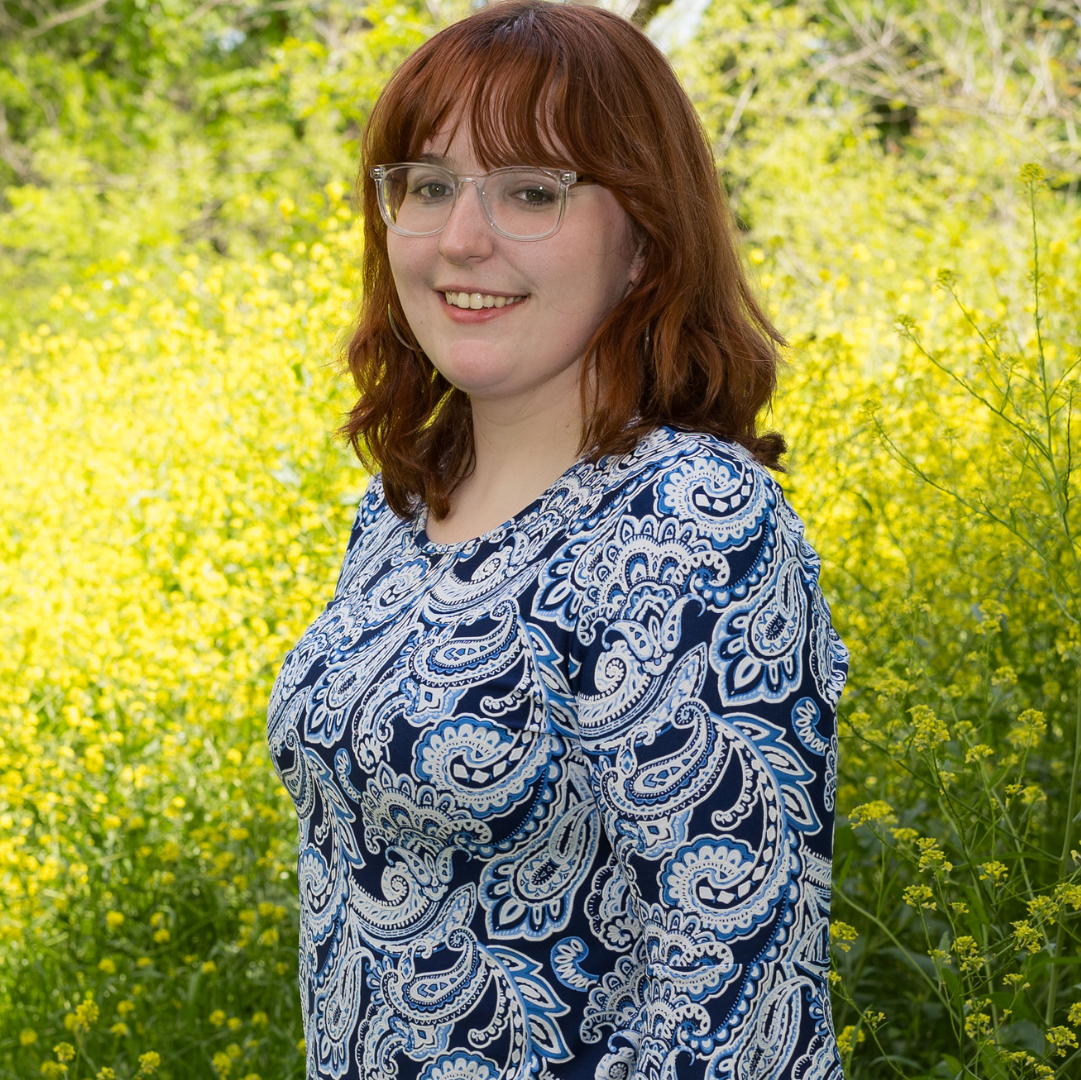
Brooke McPherson is TFN's Communications and Engagement Associate, and works across the intersections of communications, membership and data management at TFN to build connections, expand learning and deepen engagement across our network.
Highlights from the 2024 Smart Growth California Funder Summit | Cross Post
Smart Growth California is an initiative of The Funders Network. Ron Milam, the Director of Smart Growth California, wrote about his experience at the 2024 Funder Summit in Sacramento.
BY Ron Milam, Smart Growth California
We’re thrilled that over 70 people joined our Funder Summit in Sacramento, and excited to witness the sparks that ignite when new people meet and longtime colleagues see each other again.
We started with a welcome from Dion Cartwright, The Funder Network’s new President and CEO. She shared TFN’s work to center racial equity, focus on community, develop leaders and connect changemakers (Smart Growth California is an initiative of TFN).
We then engaged in a high-level overview of where California stands in addressing its climate goals. The conversation was particularly meaningful for us since Smart Growth California got its start 15 years ago in the wake of landmark legislation that set these climate goals. Numerous leaders engaged with ClimatePlan network joined us for this discussion and provided their insights.
We know that not everyone in our funder network directly funds transportation, land use and climate policy. But we felt it important to start with a deep look at these issues since they directly impact health and equity outcomes.
Read the full post on Smart Growth California’s website here.
Claiming the Future: A Conversation on Futurism and Philanthropy
The Funders Network is committed to sharing the stories and strategies of our members, partners and others in the philanthropic sector working to create more sustainable, prosperous and equitable communities. Today, we're sharing a guest blog post from TFN member Robert Wood Johnson Foundation (RWJF) highlighting a recent conversation between Trista Harris, President of FutureGood, and Jessica Clark, Founder and Executive Director of Dot Connector Studio, about the work of professional futurists.
Over the past five years, both have served as “futurists in residence” at RWJF, working with the Pioneering Ideas for an Equitable Future team to help spot signals and trends relevant to health equity. (We also featured Trista in our April TFN webinar How to be a Future-Focused Leader...Now.) Their conversational interview focuses on Jessica's professional development as a futurist and her thoughts around foresight in the social sector.
BY Trista Harris, FutureGood, and Jessica Clark, Dot Connector Studio
Trista: Thank you for agreeing to have this conversation with me. I appreciate your willingness to chat about your thoughts about futures-thinking as it relates to philanthropy and the nonprofit sector. I have just got a handful of questions. But first I want to hear a little bit about your futurism journey. So, how did you get interested in it?
Jessica: Oh, I have been interested in futurism since I started reading science fiction with my dad back in the ‘70s. And then I wrote a Master’s thesis in the early ‘90s on the role of women in cyberpunk literature and what those representations told us about the way the new public sphere was emerging. That was back before the internet had pictures!
Since then, I’ve kind of been ping-ponging between these three topics: public sphere, science fiction, and emerging technology. That has been my career for the last two decades
Trista: I love it! I have met so many folks who have come to futurism via sci-fi. I mean, that is the space where people are imagining what the future looks like. And I think it is such a good grounding, because they are great at creating a picture of what the future could look like: good or bad. There is a lot of bad…
Jessica: Right
Trista: But lots of folks are working on good versions of the future as well.
Jessica: Correct.
Trista: So tell me about your Futurist in Residence role at the Robert Wood Johnson Foundation. What have you been working on? What have you been doing?
Jessica: Well, the role actually sunset for me a few months ago. Currently, they have a Speculative Fiction Writer in Residence, Karen Lord.
Trista: I didn’t know that! That’s amazing!
Jessica: But I’m still working with them to try to understand the funding that they have been doing in the futurism space. They are really interested in this concept of “democratizing the imagination of the future”. Trying to bring in many different voices, and perspectives, and specializations to the question of how to achieve health equity. Then, I’m working a little bit with the communications team. They have tools like the Share Your Hunch site, which allows people to come in and submit their hunches about what they are seeing, feeling, or noticing as a way to incentivize open idea generation.
Trista: I love it. And, this is not your first time partnering with philanthropy. So, tell me how it was different to be sort of in the futurism team in a foundation as opposed to, what I lovingly call myself, “the weirdo from the outside” who’s like, Care about the future!
Jessica: [Laughing] Indeed, “the weirdo from the outside” is my middle name. So, yeah, it was great to be embedded in a team that is really devoted to innovation and very experimental and trying constantly to not only spot new trends, but also to understand the different ways that people operate in the world— from art to organizing to literature to…you-name-it! Trying to really bring all these different inputs into weekly meetings. They have an Ethicist in Residence, too. So talking about the social dimensions of futurism and innovation, which I think is pretty unusual. A lot of futurism is very corporate, or very instrumental and government-focused.
And also the grantees are just amazing. Because the team has an open portal that allows people to apply from a very broad array of spaces about projects related to the future of food, work, evidence, and other topics. They are all very different and they are all really working in whatever field they are inhabiting to try something new. So, it’s a super-lively, almost salon-like environment
Trista: I love that. And then you were a part of one of our 2023 FutureGood Studio cohorts. It was fantastic to have your expertise in that space and that was really appreciated by other participants. Can you tell us a little bit about your experience in that cohort? What were some highlights for you?
Jessica: I thought it was very thoughtfully designed. There were a lot of nice little touches, like you sent out a package for all of us to make tea together and just sort of have a virtual social hour. There were a lot of nicely designed materials. It was really well put together, especially for people who are new to the space and might find it intimidating. And you had an interesting cross-section of practitioners from non-profits, philanthropy, and other social good endeavors. So, it wasn’t just similar pathways people were exploring; there were various ways to incorporate these concepts into their lives and their work. And there were a few things…I mean, I have read a lot of futurism books [laughing]...
Trista: [Laughing] Yeah!
Jessica: So, I was familiar with some things. But there were also a few things which stuck with me. One was the idea of skipping the problem, both for mental relief and to generate creative solutions.
Trista: Mmm hmm.
Jessica: Which is very hard for those of us who are problem-focused! [Laughing]
Trista: Yes!
Jessica: To think about what if the world were actually what we had been fighting for this whole time. What would we do then?
Then the other one is thinking exponentially, which I always have a hard time with — even though I have witnessed just tremendous exponential change over the course of my career and, of course, all of our lifetimes.
Trista: [Laughing] Says the person who referenced “the internet without the photos,” so yes, you’ve seen it!
Jessica: I wonder if it’s almost a gender training or, maybe a non-profit mindset to not think exponentially, to be kind of humble.
Trista: Yeah.
Jessica: Whereas our world is actively changed all the time by people who are heedlessly thinking exponentially without any regard to the impact on other humans. So, those of us with some sort of a mission need to learn to do that as well — not just leave it up to the Elon Musks of the world.
Trista: Yes. I think you’re right. Like, this idea of don’t look at us, we’re just doing little things over here, both as a gender thing and as a non-profit sector thing of, like, don't put your head up too high because it might make people nervous about the work you’re doing. So everything winds up sort of under the radar. And that is not how you solve big problems!
So, how do we get out of that space and really claim the future we want to create? As opposed to constantly responding to the Elon Musks of the world and going No, not that! Oh my God, please not that!
Jessica: Non-profit work is gap-filling work. It is also bringing-people-up-who-don't-have-resources work.
It often tends to be, even if it is replicable, small scale or marginal, by definition. So how do we use some of the positive aspects of art and fiction writing and the most audacious activist visions we can tap into to think not just about fixing the problem, but also actually enjoying our lives?
Stuff like thriving, you know, doing things that are beyond the bare minimum or beyond the gap being filled, as if it were some road surface we were repairing.
Trista: I used to run a social justice foundation and when Obama was elected, everybody’s strategy had been fighting against. And, so, then he was elected and the strategy remained fighting against. And I was like, You know the person that, like, runs this federal agency — call them and tell them what you want! They are trying to partner with you! And, we’ve lost that ability - to build instead of stopping things from being built.
It is really beautiful when people have a picture of the future that they want to create that is equitable and serves people well. Like, Talk about that. That’s the piece that I think has really been missing in the sector.
Jessica: Yeah, I agree. I mean everyone right now of course has their heads in the election. And that not only is very short-sighted and very personality-focused, but it puts too much power into the hands of elected officials to shape what we feel is possible, to be more visionary and hopeful.
Trista: They’re not around long enough to create the long-term future that we need and, yet, we put in their hands, like, What’s it gonna look like for my grandchildren? And they are like, I am totally focused on this media cycle. [Laughs] It’s completely broken - what we need for the long term future.
So tell me a little bit about why a foundation leader should build their futurism skills? Why should they care about the future?
Jessica: There are different reasons. One is what we just said, they need to get out of the news cycle and the crunch and the panic and the crisis. To move out of reactivity and into creativity.
Trista: Mmm hmm.
Jessica: Also foundations have luxury, they can set a long term agenda if they want. They might have to answer to their boards — but there are relatively unfettered roads in front of them if they decide that they want to be leveraging things to affect long-term, generational futures.
Also, it’s just refreshing. Being a funder is a weird identity — people are constantly gnawing at you with their needs or their perspective on what the thing is and how you should solve it. It’s just nice to be able to take a step back and say, What are we really trying to do here? What do we really want here? Especially with your grantees or with your community — that would be the way to do it. It is not always to be in the funder-grantee mindset but to be really thinking about the end users.
Trista: Yeah. I love it. I love it!
--
About the Authors
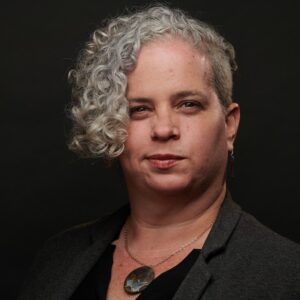 Jessica Clark is a futurist focused on media, culture and democracy, and the founder/executive director of Dot Connector Studio.
Jessica Clark is a futurist focused on media, culture and democracy, and the founder/executive director of Dot Connector Studio.
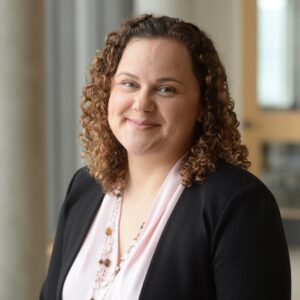
Trista Harris is a Philanthropic Futurist and President of FutureGood.
Header: Photo by PIRO4D is licensed under CC BY-NC-SA
Going PLACES: Love as a Force to Dismantle White Supremacist Systems
BY Maria Aquino, Senior Program Officer on the Priority Communities Initiative at The James Irvine Foundation, and 2023 PLACES Fellow
During the third PLACES site visit, our cohort ventured into the Southwest to Santa Fe, N.M. In the PLACES tradition, our first day provided some foundational context about the city, which was led by City of Santa Fe historian and author of Environmental Justice in New Mexico, Valerie Rangel. Valerie used an innovative community-informed ArcGIS Storymaps tool to walk us through the region’s history using images and narrative. We learned a more accurate storytelling of the multiple invasions and genocide this part of the country has experienced, and the many faces of white supremacy that continue to be glorified with bronze emblems memorializing the ideology of colonization. Yet, the region’s history began long before any Europeans brutally claimed rights to its land, and situating the story with Indigenous people at the vanguard is an act of resistance and liberation that Valerie intentionally located within the timeline and geography of the story maps.
The mural in the picture, which celebrates colonialism, adorns the walls of the St. Francis Auditorium at the New Mexico Museum of Art in Santa Fe. Fellows learned about local efforts to foster a collaborative creative community and
support people, ideas, and art forms that are underrepresented in Santa Fe's art scene.
Despite its history, Santa Fe has also been the setting of survival, resilience, culture, and healing, particularly within its Tribal nations. That is what the PLACES journey has shown us overall, as we have journeyed to various battlegrounds where the forces of racism are fought by everyday heroes who are building a future of solidarity and belonging. Santa Fe was no different, and during our trip we met with foundations and nonprofit partners working to shift power, build multi-racial solidarity, promote radical inclusion, and honor Indigenous sovereignty.
Changing Philanthropy & Trusting Indigenous Leaders
After our historical grounding, we ventured outdoors to the Glenn Green Galleries. In the garden we were surrounded by sculptures and pine trees, where we heard from James Calabaza of Trees, Water, People, JoAnn Melchor, CEO of the New Mexico Foundation (NMF), and Garrett Altmann from the Environmental Policy Innovation Center (who partners with the Santa Clara Pueblos.) JoAnn shared that despite having over 20 years of experience in nonprofit work, her leadership was questioned from the start, which is demonstrative of the change that is still needed in philanthropy to trust leaders of color. JoAnn understands that being from the community means she is not only accountable to the foundation, but more powerfully to her own community. Trusting leaders of color can create transformational change, especially when they in turn trust and implement the solutions generated by communities that experience the systemic inequities philanthropy seeks to address.
When JoAnn joined NMF as CEO, she demonstrated early on that being from the community meant she would bring significant changes. At the onset, she convened all the Tribal nations in New Mexico to hear how they reimagined partnering with the foundation. NMF practiced trust-based philanthropy, designating funding to implement community-identified priorities. They onboarded Indigenous woman-led, Roanhorse Consulting and formed a grant review committee comprised of community members. On the administrative side, they decreased grant proposals to one or two pages and shifted to culturally responsive reporting, such as poetry, video, and storytelling. These culture and practice changes put power back in the hands of grantees so that they could focus on the transformative work they do daily.
Culturally Affirming Philanthropy
As a queer Latine woman of Indigenous ancestry, our second day was one of my most culturally affirming experiences in philanthropy. A panel highlighting the LGBTQIA2S+ community shared their advocacy and movement building efforts in the state. We met co-founders of Indigenous Ways, Elena Higgins and wife, Tash Terry, who set the tone with a song about Indigenous wisdom about what connects us to each other. They spoke about the power of love as a force to disrupt systems, serving as an antidote to hate and division, while promoting healing. Indigenous Ways educates people about certain ancestors’ views that recognize 5 genders and see queer people as healers. We also heard from T. Michael Trimm, executive director at the Transgender Resource Center of New Mexico, who practices intersectional equity by uplifting trans, nonbinary and gender nonconforming people through advocacy, direct services, and trans cultural fluency education throughout the nation.
PLACES Fellows met with local leaders from the Pueblo of Santa Clara, Trees Water, People, and New Mexico Foundation to
learn how trust-based philanthropy can create a rebalance of power when engaging with Indigenous communities and honoring Indigenous sovereignty.
We then joined a panel of artists of colors, Rashaan Ahnad (Vital Spaces & Earthseed Black Arts Alliance), Israel Francisco Haros (Alas de Agua), Ehren Kee Natay and Gabriela Gomez, senior director of Meow Wolf Foundation. The artists opened up about the challenges of being artists of color in the region, where inclusion can be performative, and racism often limits their access to funding. In sharing their stories, I could see how distressing these experiences of exclusion are, as the artists contend with the rising cost of housing and gentrification, making it hard to stay in Santa Fe. Paradoxically, we also heard about the hardship of being a funder with limited resources dedicated to supporting artists of color, despite intending to resource the work more holistically.
Israel articulated the complex environment they navigate as one in which three forms of white supremacy are persistent; white supremacy, liberal white supremacy, and white Hispanic supremacy (which allies itself with Spanish European colonizers). There was a turning point in the conversation when a PLACES Fellow named the tension between the artists’ struggles and philanthropy’s space of privilege where funding often excludes them and goes to larger art institutions. Acknowledging this inequity allowed us to shift into a more honest conversation about how philanthropy has perpetuated white supremacy and further marginalized BIPOC artists. In a space of truth telling and authentic listening we stepped into bearing witness to the damage that unbalanced power dynamics in philanthropy has caused.
Racism and Healing
Throughout the Santa Fe trip I sensed a likeness to my only previous visit to the Southwest as a teenager, when our family caravanned to Guadalajara one summer. We drove from California through Arizona, New Mexico, and Texas before crossing south of the border. While passing Arizona, a white man yelled at me and my cousins, “Go home wetbacks.” He used the derogatory term for people who cross the Rio Grande to the U.S. My cousins, who are half Navajo, yelled back expletives at the man letting him know he was the one on foreign land. Though I felt vindicated by my cousins’ response, that experience colored my view of the Southwest. In Santa Fe, no one yelled at me to “go back home,” but I still got the message, just as I did in Arizona long ago, that people who look like me are not welcome.
Even so, I am fully aware that anti-Indigenous and anti-Black racism is not unique to the Southwest, without a doubt it is white supremacist ideology that led to the creation of this country and shaped its systems. This is systemic, yet it is also personal, and it saddened me to reflect on the anti-Indigenous racism I’ve experienced in my own life, within my own culture and family. Colorism, rooted in white supremacy, has created profound wounds, and led many in my family to reject our Indigenous ancestry. Perhaps there was a time when it was necessary to survival, because of the violence of colonization, yet the hurt has continued for generations. White supremacist culture makes its way into every part of our lives, no matter where in this country we reside, and without acknowledging it, old wounds continue to run deep, and new ones get created. While there is still much work needed to dismantle white supremacy within systems, I felt the gravity of the simultaneous work needed to heal from its harms.
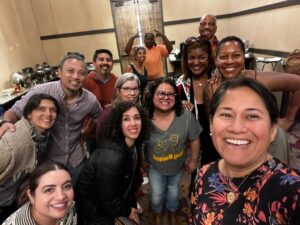 PLACES Fellows celebrating another great week of learning at the end of their visit to Santa Fe.
PLACES Fellows celebrating another great week of learning at the end of their visit to Santa Fe.
Santa Fe showed me that while racist sentiments are pervasive, there are leaders who are using art, song, storytelling, and cultural practices for healing and to create spaces that celebrate diversity, center racial justice, and build power. As we concluded our trip, Bina Patel left us with our ongoing assignment in philanthropy: to continuously reflect on how we are present for someone else’s grief, bear witness, and stand in solidarity. Philanthropy can be a difficult space to occupy, but within it we hold power and privilege that should be shared and relinquished to communities. Through PLACES we have been in community, among our fellows and the bridge building leaders we’ve met along the way. As we journey back to our offices, we are called on to use philanthropy for good by bringing more heart to the work and make progress towards liberation. For this I take with me the message that Elena and Tash offered, that love can be an antidote for division and a force for changing systems.
About the Author
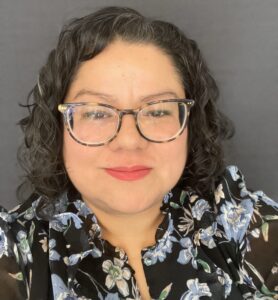
Maria Aquino is a senior program officer on the Priority Communities Initiative at The James Irvine Foundation, focused on supporting a local economy that works for all by increasing access to quality jobs and ensuring community voices drive economic development. Maria is a member of TFN's 2023 PLACES Cohort.
A Reminder to Be Bold and Courageous Leaders
This post originally appeared in the PLACES Connection December 2023 newsletter.
BY Dion Cartwright, Director of Equitable Initiatives and Leadership Development and Incoming President and CEO
As I reflect on the last seven years at TFN and what journey lies ahead, I become full of gratitude and heartfelt appreciation for the people that I’ve had the pleasure of being in community with over the past seven years. I have gained some of the most amazing friendships, visited beautiful cities, learned from leaders across sectors and worked to advocate for and address some of the most pressing issues of our time.
I also got to be a witness to the brilliance and resilience of the many people we’ve been honored to meet that fight for true change in the face of adversity. Our travels introduced you to opportunities to hear from community and nonprofit leaders to learn about the atrocities they face and their local and regional efforts to confront them head on.
In states like West Virginia, where issues of addiction and poverty are at the forefront, healthcare issues in rural Kansas, or major climate issues that impact Indigenous communities in Standing Rock, North Dakota.
We also bore witness to the the immigration challenges faced by boarder communities in El Paso, and the water crisis impacting people in Flint.
Even recent attacks on our democracy and the constant pain and suffering facing people here in the U.S. and beyond, there were no shortage of challenges communities faced. There was, however, a shortage of courageous and systemic actions philanthropy had taken to address them.
What makes PLACES such a special program is our willingness to unpack the hard truths about the individual, institutional, and racial inequities that exist within the philanthropic sector and the systemic inequities communities are facing every single day. There is a willingness that participants have had to address these challenges in their grantmaking and engagement efforts. A willingness to be bold and courageous in efforts to dismantle systems of oppression while at times being challenged with our own strategic complicity as we navigate personal truths, our own safety, and even the realities of our own identities and journeys that influence who we are and our approach to the work.
The work doesn’t stop there. This note is a reminder to each of you to never forget the power you hold to influence change, create a bold, unobstructed vision and new approaches to this work. Think about what you can do from your position of power and how you might bring others along in your effort to change the world.
As someone who has committed their career to investing in people, communities, and intergenerational leadership, I am honored that TFN has chosen me to not only lead the organization into its next chapter, but also to advancing our mission and creating a home for philanthropic changemakers like yourselves, working to create more just, sustainable, prosperous, and healthy communities for all. The opportunities I see ahead for TFN, and the sector excites me, and it continues with each of you. Each one of you represents an opportunity for us to collectively be BOLD and COURAGEOUS in our fight for JUSTICE. I hope you continue to join me in helping philanthropy live up to its name. #NoMoreFuckery
About PLACES
PLACES — which stands for Professionals Learning About Community, Equity and Sustainability — uses learning, coaching and reflections to explore structural racism, community empowerment and equitable grantmaking practices. In addition to the PLACES curriculum, Fellows learn from the people and places we visit. Our Fellowship Cohort, selected annually from a highly competitive pool of applicants, embarks on year-long journey that includes four site visits to communities across the U.S. and Canada.
The PLACES Fellowship concludes with a capstone presentation and graduation — but that rarely marks the end of the PLACES experience. As any PLACES alum will tell you, the deep bonds and professional connections forged by the Fellows extend well beyond the end of their cohort year. Learn more about the PLACES fellowship and alumni here.
Applications are now open for 2024 TFN PLACES Fellowship. The deadline to apply is Jan. 5, 2024. View the application and apply today!
About the Author
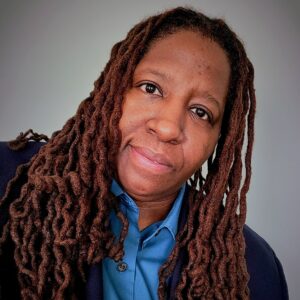 Dion Cartwright is TFN's incoming President and CEO. Prior to CEO, Dion served as senior director of equity initiatives and leadership development, where she directed the PLACES Fellowship program and lead the organization’s work to address equity, inclusion, and structural racism. She was a 2010 PLACES Fellow and chaired the PLACES Advisory Board for four years before joining TFN’s staff.
Dion Cartwright is TFN's incoming President and CEO. Prior to CEO, Dion served as senior director of equity initiatives and leadership development, where she directed the PLACES Fellowship program and lead the organization’s work to address equity, inclusion, and structural racism. She was a 2010 PLACES Fellow and chaired the PLACES Advisory Board for four years before joining TFN’s staff.
PLACES 2024 Fellowship Applications Now Open!
We know that philanthropy attracts people who care deeply about creating positive change. But we also recognize that funders often face obstacles in turning ideals into impact — especially when faced with the prospect of untangling decades of systemic inequities that have caused grievous harm to our most historically marginalized communities.
The good news for people seeking to do good work: You don't have to go it alone.
Applications are now open for TFN's PLACES Fellowship, an eight-month learning journey designed to help grantmakers embed the values and practices of environmental, economic and racial justice into their work. The EXTENDED deadline to apply is Jan. 10, 2024. View the application and apply today!
PLACES, which stands for Professionals Learning About Community, Equity and Sustainability, cultivates and connects leaders passionate about addressing a wide range of issues — such as the escalating climate crisis, barriers to opportunity, the erosion of civil liberties and legislative assaults on bodily autonomy.
Regardless of their grantmaking portfolios, PLACES Fellows are equipped with the tools needed to understand, challenge and change systemic inequities, and translate that learning into meaningful action and impact.
PLACES not only benefits those individual grantmakers, but enriches their institutions and the field of philanthropy as a whole.
We encourage you to apply for the PLACES Fellowship if you’re looking to:
- Expand your understanding of systemic racial, social and economic inequities and their impacts on policy, culture, communities and climate.
- Acquire the tools and resources to embed the values of equity and justice in your work as a grantmaker.
- Explore and challenge your own biases and blind spots, regardless of your background, about who you are and how you create change.
- Forge deep connections with other leaders in philanthropy who are deeply committed to shared learning and collaboration.
Invest in your personal and professional leadership growth. - Tap into the resources and opportunities as a member of the PLACES Alum Network, including alum-only learning sessions, networking events and digital platforms.

About the PLACES Fellowship
The 2024 PLACES Fellowship will be an in-person experience, although we recognize that the ongoing COVID-19 pandemic may require us to be flexible.
Key 2024 Fellowship Dates*
- May 13-17: Cleveland, Ohio
- July 10-12 :Denver, Col.
- Sept. 18-20 - Toronto, Ontario, Canada
- Nov. 13-15: Sacramento, Calif.
*Dates are subject to change.
Fellowship Fees
For accepted participants, the following fees will apply:
- TFN Members: $750
- Non-members: $1,250
Fees help support the programmatic and operational costs associated with the fellowship, including but not limited to, speaker honoraria, facilitator fees and group transportation. Fellows will be responsible for travel costs and hotel accommodations for site visits. (Limited travel sponsorships will be available to offset travel costs and are subject to availability.)
Find Your People: PLACES Alum Network

2023 PLACES Fellows at their site visit to Detroit.
The PLACES Fellowship is one of TFN’s most significant efforts to foster courageous philanthropic leaders who are engaged, emboldened and equipped to bring about meaningful change. Over the past decade, PLACES has welcomed more than180 leaders in philanthropy committed to deepening their understanding of environmental, economic and racial justice. Translating those skills into practice has taken on increased urgency as we face overt efforts to undermine the values of diversity, equity and inclusion in our libraries, classrooms, college campuses and other areas of civic life.
Now, more than ever, we need bold leaders in the philanthropic sector who can serve as ambassadors and advocates for justice.
By becoming a PLACES Fellow, you’ll have opportunities to continue your learning and connect with peers in the sector through the PLACES Alum Network. This amazing network is comprised of alums from all corners of the United States and Canada, representing national, regional, family, corporate, and community foundations as well as philanthropy serving organizations and other funding institutions.
Recent cohorts have addressed issues impacting disenfranchised communities, including structural racism, gender justice, health equity, environmental sustainability, economic development and community engagement — asking difficult questions and exploring uncomfortable truths along the way.
→ Meet the 2023 PLACES Fellows

What We've Learned
Earlier this year, we retained an outside firm to conduct a comprehensive evaluation of the PLACES Fellowship and Alum Network. The results reinforced our commitment to creating a space for funders to come together to find inspiration, solidarity and shared purpose, both during and after their PLACES Fellowship experience.
Some key findings shared by the PLACES Alums surveyed:
- 81% reported increasing grants to organizations led by and serving people of color.
- 83% said PLACES help them better connect sustainability issues to racial justice.
- 86% of surveyed alums reported advocating for more equitable practices
- 95% of surveyed alums said PLACES provided them with skills, tools, and resources to advance practices that promoted equity in their organization.
- 93% of surveyed alums said PLACES provided them with skills, tools, and resources to advance practices that promoted equity in their grantmaking.
- 92% of surveyed alums said PLACES helped them better understand the culture of white supremacy and how it shows up in philanthropy.
What We're Sharing
After each PLACES site visit, we ask the Fellows to reflect on their experiences in our blog series Going PLACES. Check out some highlights from our PLACES alums:
- Going PLACES: Fostering a community for youth in Detroit | Monae Dale, Program Manager, Housing & Economic Opportunity at the California Community Foundation, and 2023 PLACES Fellow
- Going PLACES - Trading Palm Fronds for Maple Leaves: What Two Demographically Distinct States can Learn from Each Other | By Xan Avendaño, Program Officer at The Harry and Jeanette Weinberg Foundation and 2022 PLACES Fellow.
- Going PLACES: What the Newark Rebellion can teach us about Philanthropy | By Grace Chung, Senior Community Development Officer, LISC New York City and 2019 PLACES Fellow.
- Go Deeper: For the 10th anniversary of TFN’s PLACES Fellowship, we asked PLACES alums to share what inspires, motivates and challenges them in their efforts to embed the values of racial, social and economic equity into their work. The result was PLACES X: Stories of Impact, which includes essays and videos. Explore the full multimedia project here.

TFN's Member Portal is now open to all PLACES Alums!
As a PLACES Alum, you know that the deep connections and passion for learning forged during your PLACES Fellowship extend far beyond the end of your cohort year. So we're making it easier for PLACES Alums to stay engaged — even if you don't work for a TFN member organization or have moved away from philanthropy altogether.
We're excited to share that TFN's Member Portal is now open to all PLACES Alums, regardless of your employment status.
TFN's Member Portal includes a searchable database of funders — and PLACES Alums — as well as the ability to update your professional info and access member-only recordings and resources. This password-protected, peer-to-peer platform is designed to support collaboration, deepen understanding and spark connections within our network and beyond. (Those of you who currently work for TFN member organizations may have already signed up for the Member Portal when it launched this summer.)
Funders across TFN's community of working groups, initiatives and other programs have often asked for a way to reach out to fellow grantmakers who are based in their area or working on similar issues. That desire to connect is especially strong across the PLACES Alum Network. In fact, that was one of the key pieces of feedback shared during our recently completed PLACES evaluation. (More on that in the coming days!)
As part of our commitment to supporting a vibrant PLACES Alum Network, we've also created two other ways for you to connect with the PLACES community:
- Join our PLACES Alum LinkedIn Group to share shout-outs, professional opportunities and other resources.
- Once you've signed up for TFN's Member Portal, you'll also get an invite to our new PLACES Alum Slack Channel, which will be another alum-only space to chat, commiserate and strategize.
Are you ready to access TFN's Member Portal? Just fill out our simple sign-up form. You'll then receive a welcome email with your username and login instructions.
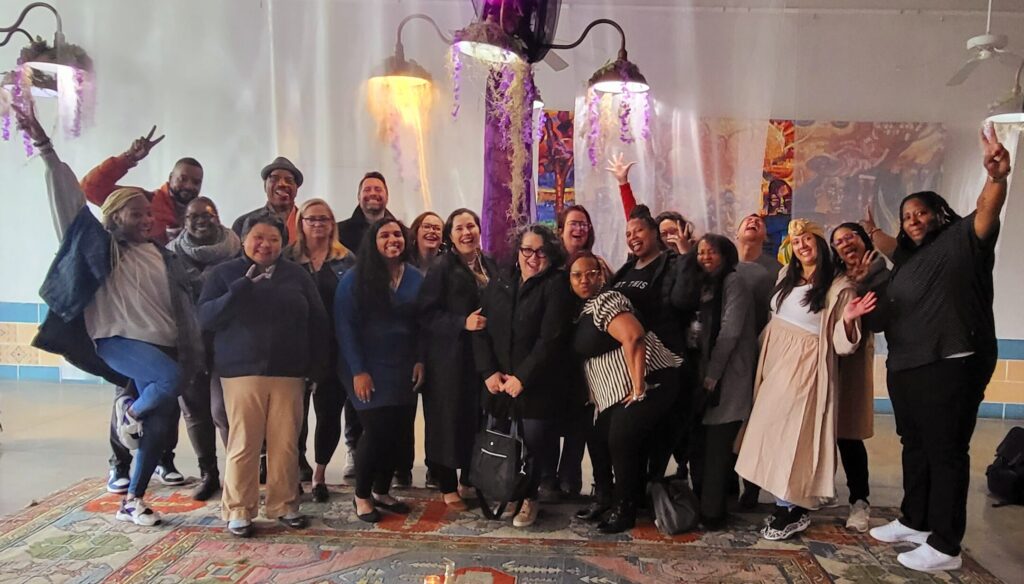 PLACES alums kicked off #TFN2023 at the New Orleans Healing Center
PLACES alums kicked off #TFN2023 at the New Orleans Healing Center
Here's what you'll be able to do once you have access to TFN's Member Portal:
Connect
Curious to learn how many PLACES Alums are active in a specific state or region? Or who is focused on issues such as environmental justice or workforce development?
Our Funder Directory is a searchable database that will let you search by name, organization, focus area, geography or PLACES cohort year. In addition to PLACES Alums, the directory includes funders whose organizations are members of TFN or have engaged with TFN events and programming in the recent past.
Tip: Do you know a PLACES Alum or colleague at a TFN member organization who hasn't signed up for TFN's Member Portal? Click the Refer a Colleague button to share the Member Portal sign-up link directly.
Learn
Did you miss the latest PLACES webinar? Or wish you had easy access to the PLACES Connections Newsletters and other messages?
You'll find back issues of PLACES Connections on the portal, as well as links to resources and blog posts from the PLACES community. To access recordings and materials from TFN webinars, explore the Event Resources featured on TFN's Member Portal.
Please note that we're only sharing recordings from the relatively recent past, and only when participants have been alerted that the event is being recorded. For example, certain peer-to-peer learning sessions and other virtual convenings have not been included, as facillitators often ask for those events to remain "off the record" to encourage frank exchanges of ideas and experiences.
Tip: This feature also links directly to TFN's Event Calendar, so you can see and sign up for future events.
We'll continue to add to this section, so be sure to check back and see what's new!
Engage
Do you want to let the PLACES Alumni Network know that you've changed jobs, or share more about your grantmaking focus?
Click on the Update Your Profile to access your individual TFN profile, allowing you to make updates to your title, organizational affiliation, focus area, and other information. Updating your profile information will help enrich the Member Portal overall — making it easier for you and others in the network to engage with fellow funders whose grantmaking interests align.
Do you want to get involved in a TFN working group or find out more about upcoming events and learning opportunities?
Update your TFN Program Affiliations in the Member Portal, which features a menu of our working groups and collaboratives. Follow the links to learn more about each program area and sign up to indicate your interest in receiving news, updates and invites to webinars and other learning opportunities.
Tip: If you want to see which funders are engaged in what TFN working group, just search the Funder Directory under "program participation."
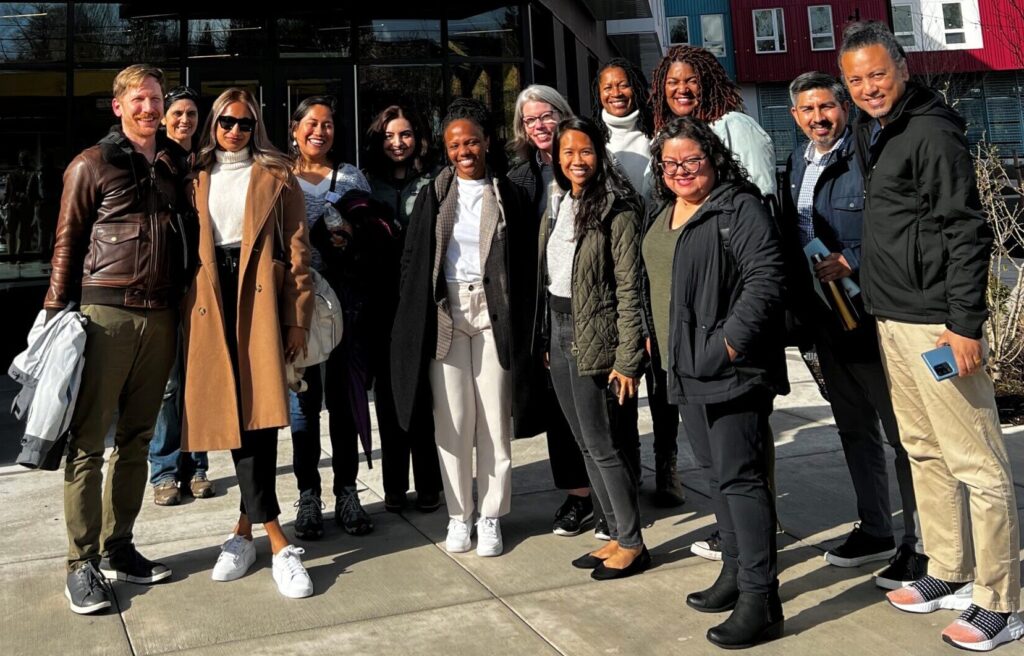 PLACES Portland Site Visit
PLACES Portland Site Visit
Member Portal & PLACES Access FAQs
I'm a PLACES Alum. Why can't I access TFN's Member Portal?
All PLACES Alums are automatically eligible for access to the portal, but if you encounter any issues please reach out to membership@fundersnetwork.org.
What if I don't want my information included in the Funder Directory?
No worries. You can update your sharing settings in the Update My Profile section.
I already signed up for TFN's Member Portal. Where's my invite to the PLACES Alum Slack Channel?
Keep an eye out for the email invite to join us on Slack (and be sure to check your junk/spam folders.) If you have any issues, please reach out to membership@fundersnetwork.org.
Does the Funder Directory only include funders who work at TFN member organizations?
Nope! Any funder who has engaged with TFN in the recent past, including attending our Annual Conferences or learning webinars, and who have agreed to share their information are included in the Funder Directory. (You'll see a checkmark noting which organizations are TFN members.)
What if I see info about a PLACES Alum or colleague that's incorrect?
Please let us know! Kindly send an email to membership@fundersnetwork.org and we'll follow up.
Is there a Member Portal Code of Conduct?
You betcha. We want to ensure that TFN’s Member Portal remains a considerate, caring and useful resource. You'll be asked to agree to our Code of Conduct when you sign up for the portal, acknowledging that:
- TFN does not allow language that harasses, threatens or defames others, or language that is derogatory toward people or communities based on, but not limited to, race, ethnicity, gender, sexual orientation, gender identity, religion or ability status.
- TFN does not allow the data and resources found on the portal to be downloaded or repurposed in any way without appropriate consent of relevant individuals and creators. In particular, do not add contact information found on the portal to your organization's databases without consent of the individual contact.
- You will not use the portal as an opportunity for fundraising pitches or any other solicitations for financial or contractual support.
- Electioneering or lobbying activities are prohibited. (For guidance on how to effectively advocate as a nonprofit or philanthropic organization, we encourage you to visit the resource pages for Bolder Advocacy, a program of the Alliance for Justice.)
Do you have additional questions or feedback about TFN's Member Portal? Please reach out to our team at membership@fundersnetwork.org.
Going PLACES: Fostering a community for youth in Detroit
BY Monae Dale, Program Manager, Housing & Economic Opportunity at the California Community Foundation, and 2023 PLACES Fellow
As someone new in the philanthropy space, I was delighted to have the opportunity to apply for the PLACES fellowship as I prioritize professional development opportunities that challenge my thinking. I work as a program manager at the California Community Foundation and, in my role, grantmaking is prioritized through three programmatic areas: housing, economic opportunity, and mental health, focusing on youth and young adults ages 18 to 30.
As I prepared for the PLACES fellowship, in addition to learning about equity and sustainability, I wondered how I might see nonprofit organizations doing their own work in my target program areas. In our first site visit in Portland, Oregon there was a strong focus on addressing the looming housing crisis and acknowledging racism towards Black and Indigenous communities.

On their second site visit, PLACES fellows visited Detroit's Museum of Contemporary Art,
the Hispanic Development Corporation, the Stoudamire Wellness Hub among other local organizations.
Photo credit: Monae Dale
At our second site visit in Detroit, the theme of community engagement and building emerged. The experience of community was encapsulated as folks organized through movements, coalitions, and nonprofits with a focus on youth and young adults. This came as a surprise to me. Though Detroit once had a booming economy and thriving workforce, the state has also endured a decrease in economic mobility, exit of residents, abandoned homes and a water crisis. Maintaining community in a climate of adversity and lack of resources can pose a challenge. However, despite these challenges, Detroit still has a strong sense of community; and to dive deeper, a call to grow the community through youth support and young adult engagement.
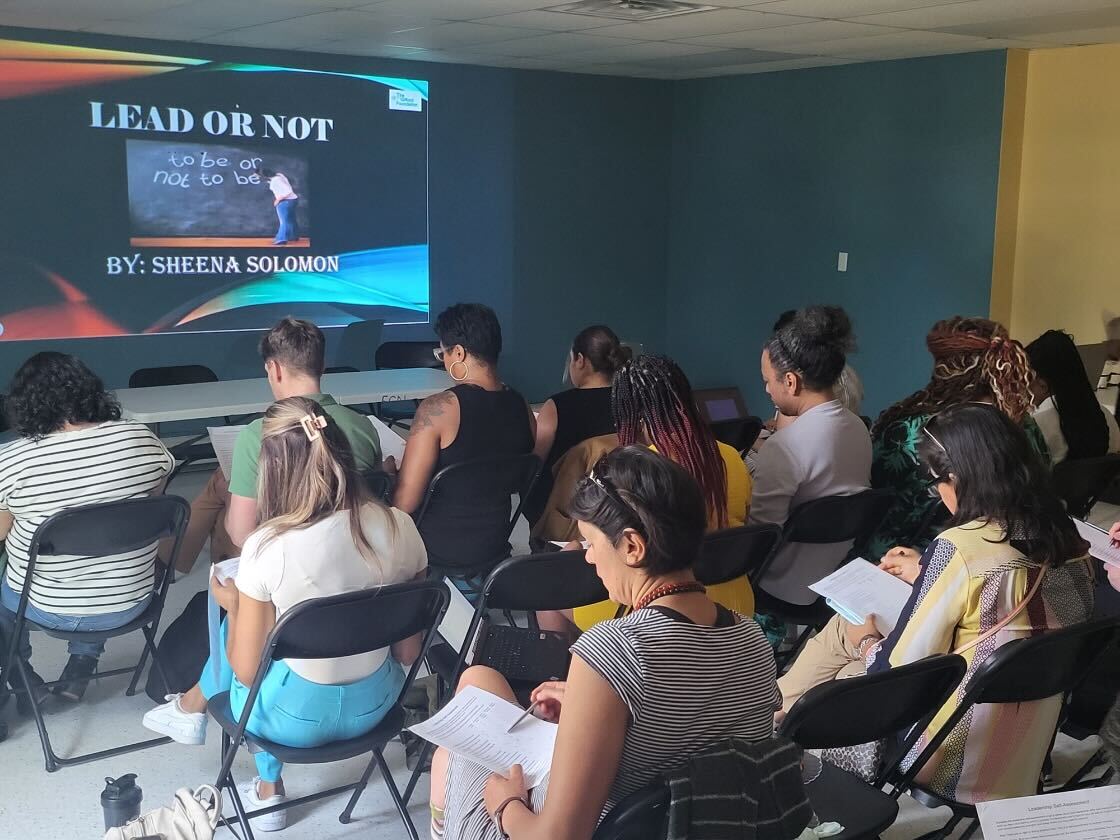 Photo credit: Dion Cartwight
Photo credit: Dion Cartwight
This was especially evident in visiting and speaking with multiple local organizations during our site visit. We were graciously welcomed at the Hispanic Development Corporation, The Stoudamire Wellness Hub and the Museum of Contemporary Art Detroit. Between the beautifully painted murals, or the open recreational space, the city felt like a place where everyone is welcomed and supported.
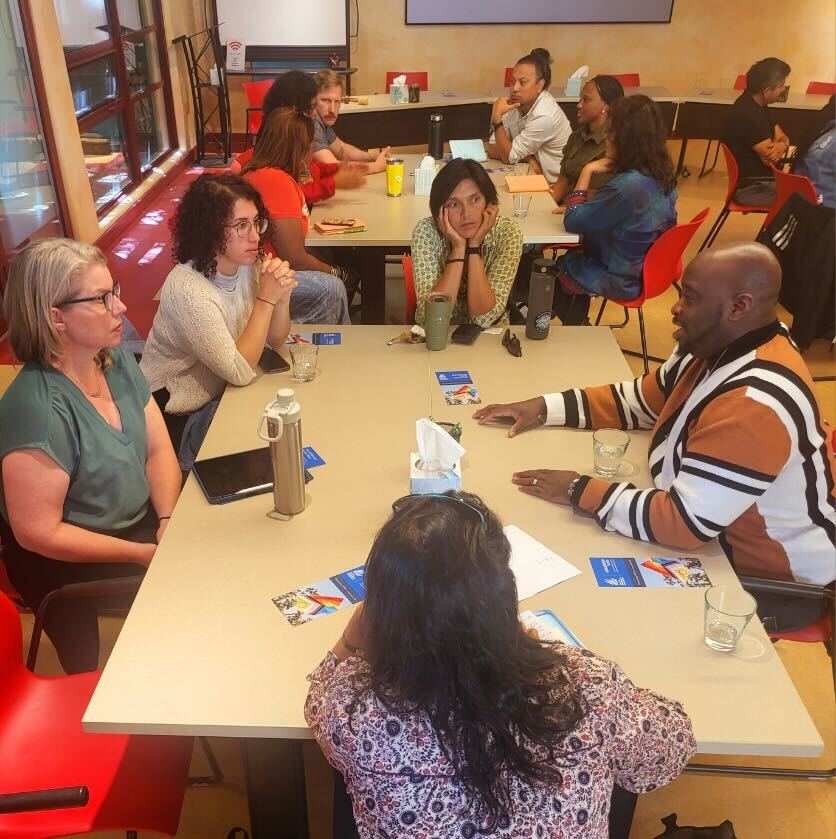 Photo credit: Dion Cartwight
Photo credit: Dion Cartwight
We had the opportunity to sit with and listen to community leaders that represented organizations such as Flint Community Lab, Flint Development Center and We the People. All of which discussed water justice and the fight against water crisis. Each organization also highlighted programming that provides a pipeline for youth through workforce development skills, multi-generational teaching, and leadership development. The theme of youth involvement continued when we met with the Detroit Hispanic Development Corporation in which they discussed the importance of their space as a neutral zone for youth. They also verbalized the need to provide workforce development skills and opportunities for youth through paid positions. Additionally, The Museum of Contemporary Art Detroit offered an eye-opening exhibit, Free Your Mind Art & Incarceration, highlighting the beautiful talent of incarcerated folks, while also calling attention to the juvenile justice system, specifically the pipeline from juvenile justice to adult incarceration and the desperate need to amend or fully abolish the system.
During my time as a social worker post graduate school, I worked in a drop-in center for homeless youth and young adults. I found that this population’s needs often go unmet. They are experiencing changes physically, mentally, and emotionally, while also attempting to navigate the world and plan for their future. It’s often expected that a young person has an idea of what they want to do straight out of high school. However, what happens to those who do not have a plan, do not have familial support, or perhaps are battling mental illness? We see that they often fall through the cracks or into a pipeline, such as the school to prison pipeline. Through this experience, I learned that creating communities for youth is key to foster positive outcomes as they enter adulthood. Youth require holistic support, safety, friendship, mentorship, teaching, etc.
I was inspired by the call for investing in the youth of Detroit. It’s imperative that we invest in AND empower youth while creating a pipeline of equity and accessibility. It is important to give up power and empower others, and I hope to see the impact of youth empowerment in Detroit.
As the great Whitney Houston once said, “I believe the children are our future, teach them well and let them lead the way.” As for philanthropy, I challenge us to explore efforts and what role we can play in fostering youth engagement, support, and holistic care in our grantmaking and advocacy.
About the Author
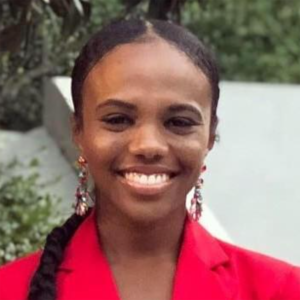
Monae Dale is the Program Manager for Housing & Economic Opportunity at the California Community Foundation, where she stewards grantmaking and capacity-building support that allows young adults to thrive in stable, vital, and affordable communities. She is also a member of TFN’s 2023 PLACES Cohort.
Barr Foundation: Centering Racial Equity in Climate Grantmaking | Cross-post
As a grantee of the Barr Foundation, The Funders Network participated in an organizational racial equity self-assessment commissioned by Barr to help nonprofits working in the climate space reflect on their racial equity efforts and benchmark their progress. In this post, originally shared on the Barr Foundation's site, Climate Director Mariella Puerto shares the story and learnings behind Barr's ongoing work to advance a more diverse, inclusive, and equity-centered climate movement.
BY Mariella Puerto, Barr Foundation
Almost two years ago, I wrote here about new work on Barr’s Climate Team to significantly increase grantmaking to people of color (POC)-led, equity-centered organizations. This is an extension of Barr’s commitment to center racial equity as a core value through our grantmaking and practices. It also stems from our firm belief that addressing climate change will only be possible with a diverse, inclusive, and equity-centered movement. In December 2021, I reported our baseline - roughly 10% ($5.2 million) of our 2019 and 2020 climate grantmaking went to POC-led, equity-centered organizations. I also stated our commitments to keep improving and to be transparent about progress.
That’s why I am thrilled to share that we have more than doubled that baseline. In 2021 and 2022, our grantmaking to POC-led, equity-centered climate organizations totaled $15.8 million, which was 22.8% of our climate grantmaking those two years. And we are projecting an even higher percentage for 2023. In this post, I want to share the story behind those numbers – five ways of working and new partnerships to advance a more diverse, inclusive, equitable, and effective climate field.
1. Investing in Existing Partners and Connecting to New Ones
Being explicit about our goal to support more POC-led, equity-centered organizations led us to deepen support to many existing partners – with larger, more flexible, and longer-term grants, and supplemental funding to build resiliency. Our commitments also guided our approach, outreach, and network building to find and support new partners.
We recognized that there are existing community-based leaders working on a range of multiple issues to address systemic injustices. Because of the trust they already hold in their communities, such leaders can be enormously effective in connecting climate to what matters most in their context, ensuring that climate action reflects local priorities, and that locals reap the benefits from the opportunities climate action creates. We revamped our Climate Program online inquiry form to add accessibility as well as clarity about our keen interest in supporting POC-led, equity-centered organizations working in clean energy, mobility, and resilience. We asked our current partners to circulate the form in their networks.
As a result of increased outreach, we’ve been excited to add several new organizations to our portfolio that were already trusted partners in their communities – such as The Alliance for Tribal Clean Energy, which is working with Native American tribes in New England to transition toward clean energy systems, and Arise for Social Justice, which is organizing low income people to fight oppression in all its manifestations, including environmental injustice in Springfield, MA (you can see all of our Climate grants since 2021 here).
Read the full post on the Barr Foundation’s website here.
Understanding Your "Why"
This post originally appeared in the PLACES Connection July 2022 newsletter.
BY Dion Cartwright, Director of Equitable Initiatives and Leadership Development
Each day we face constant reminders of the historic and current-day challenges of our society that often negatively impact our lives. I could easily list all the ways life makes you want to quit trying to change the world or change the hearts of the people in it, but I’m pretty sure if you’re reading this, your list is the same as mine.
When the narrative feels a bit overwhelming and the systemic barriers begin to feel like permanent walls, I try to remember my why. When you understand your why, you understand your purpose, and this gives you the ability to self-determine and make choices that best support the vision for your life. In the midst of these hard moments, it’s easy to lose sight of why we continue doing this work, but hard moments can also lead to a clarity of purpose.
In the face of doubt, adversity, white supremacy, and increasing burnout, remember your purpose is greater than the challenges you face. We’re not only working to improve other people’s quality of life, we are also working to improve our own lives, the lives of our families, and our children’s future. We are working on just trying to breathe a bit easier when every day a bit more of the oxygen gets sucked away.
What’s your why?
About PLACES
PLACES — which stands for Professionals Learning About Community, Equity and Sustainability — uses learning, coaching and reflections to explore structural racism, community empowerment and equitable grantmaking practices. In addition to the PLACES curriculum, Fellows learn from the people and places we visit. Our Fellowship Cohort, selected annually from a highly competitive pool of applicants, embarks on year-long journey that includes four site visits to communities across the U.S. and Canada.
The PLACES Fellowship concludes with a capstone presentation and graduation — but that rarely marks the end of the PLACES experience. As any PLACES alum will tell you, the deep bonds and professional connections forged by the Fellows extend well beyond the end of their cohort year. Learn more about the PLACES fellowship and alumni here.
About the Author
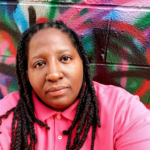 Dion Cartwright is TFN's senior director of equity initiatives and leadership development, directing the PLACES Fellowship program and leading the organization’s work to address equity, inclusion, and structural racism. She was a 2010 PLACES Fellow and chaired the PLACES Advisory Board for four years before joining TFN's staff.
Dion Cartwright is TFN's senior director of equity initiatives and leadership development, directing the PLACES Fellowship program and leading the organization’s work to address equity, inclusion, and structural racism. She was a 2010 PLACES Fellow and chaired the PLACES Advisory Board for four years before joining TFN's staff.
Photo by Shad0wfall is licensed under CC BY-NC-SA

